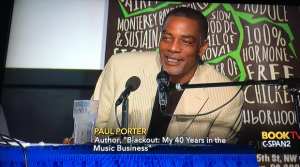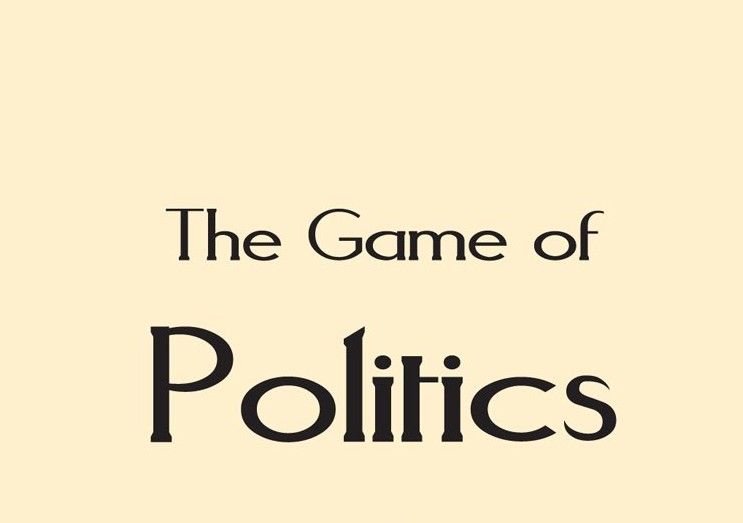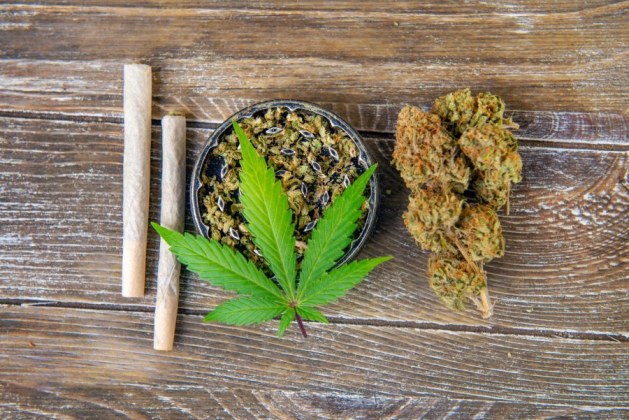(ThyBlackMan.com) Paul Porter has been in the music industry, and apart of radio, for what seems like more than a lifetime. He has watched the music change, and the industry itself as the goal became get money at all cost. In his book “Blackout: My 40yrs in the Music Business” he exposed the dark side of an industry that seems to have a valuable stake in destroying what is sacred in the music. Radio doesn’t feel the same and he has the inside perspective on how it has gone south, and ways that we can advocate returning the music to the culture with accountability in place. Paul Porter sat down with ThyBlackMan.com to talk to us about the state of hip-hop, radio and what can be done as we move forward.
TBM: After 40yrs in the music industry is Hip-Hop dead?
PP: No, its still alive and kicking. In fact, the industry hip hop is better than ever its number one in industry. The music industry saw a 16% increase last year they are making more money, so it’s still alive
TBM: Well to better clarify is the soul of Hip-Hop dead?
PP: Oh yes, its ben dead for a long time its changes its changed drastically over the last 25yrs. We all know that. Anyone who has study hip hop history know this…one of my saying is it went from lyricist to the lyric we challenged. The art of spitting rhymes has been lost. Hip-hop tracks are without MCs its just people talking. We have to deal with it. Is there still true hip hop out there yes, but its not in the commercial world. Someone like Rhapsody… I love Rhapsody, but Roc Nation put nothing into Rhapsody. Did she make a great project…of course, but you aren’t going to hear that 70 times a week on a hip-hop station. My thoughts are there are 2 types of hip hop there is commercial hip hop then there is hip hop purist. There are still plenty of things to be satisfied, but if I was 18 yrs old I have no idea what hip hop is. A new name commercial hip-hop it should be another format; its an embarrassment for real MCs
Rhapsody, but Roc Nation put nothing into Rhapsody. Did she make a great project…of course, but you aren’t going to hear that 70 times a week on a hip-hop station. My thoughts are there are 2 types of hip hop there is commercial hip hop then there is hip hop purist. There are still plenty of things to be satisfied, but if I was 18 yrs old I have no idea what hip hop is. A new name commercial hip-hop it should be another format; its an embarrassment for real MCs
TBM: Do you think artist such as the Kendrick Lamar’s and J Cole’s of the world are going to be able to survive long term like artist such as Jay-Z or Nas?
PP: No, I think the market will always have a place for them. It makes it better because the Kendrick’s and J Coles are on a different level. Kendrick just won a Pulitzer prize; that is opening doors. J Cole had the first project with no features while everyone is into features. I think there is always a spot for the Kendrick’s and J Cole’s, but it’s the other 90% that has an issue. There is always going to be a couple of folks that shine that’s true to form, but the majority are not even lose to their level when it comes to storytelling
TBM: In reading your book it shed light on a particular radio personality that I’ve wondered about…Sway. Of course, many became associated with him via MTV. What do you believe is the drive behind black media personalities turning on their own community? We have a lot of discussion on the oppression of white America, and that does exist, but when you look at Cathy Hughes, Bob Johnson or Sway…how do we answer for the fact they would feed poison to their own?
PP: Money, and capitalism. Everybody wants money, and that’s the drive behind it. It’s the same drive behind Cathy Hughes, Bob Johnson and anyone else.
TBM: I bring up Sway because what he was on MTV verses what he is now is very different. It feels completely different.
PP: Yes, but his salary is completely different. His swag is completely different, and I’ve known Sway a long time.
TBM: What responses can the average hip hop listener have to those types of personalities.? I know for myself I don’t watch BET. I was the generation that watch shows like Teen Summit and BET NEWS disappear. To those of us that knew another time what can our answer be?
PP: It’s a tough time. I met with Lisa Johnson in Philly and we were reminiscent about Teen Summit and those days…they’ve passed. Now people are watching bad TV and there are not those options anymore. I wish they were, but you are talking about history. People don’t put together shows like that there are not networks everything is short clips, YouTube, and world star hip hop.
TBM: In talking about censorship, in your book you stated you weren’t trying to pick up C. Delores Tucker’s baton, but you felt something still needed to be done. You admitted there was certain gangster rap you like, but it shouldn’t be on the air whereby kids can get access to it. Is that a question of media responsibility alone, or a greater subject for black community…and a question of parenting?
PP: We can police ourselves, but there should also be corporate responsibility; that’s what I’m concerned about. Big conglomerates have rules in the office, but don’t have rules to what they are programming to make money. There are no rules. If you said the same thing in a Radio One office that they are saying on the air you’d be fired. I just think there has to be some levels of corporate responsibility, and that’s where the game changes. There was a time at BET where we would edit out 40’s in video then over the years the restrictions kept getting worse. This was the same with radio; there were time we wouldn’t play record with too many edits. Now everything is mutha…
TBM: Is this something, in radio, that just plagues the hip-hop genre or is it something you see happening in radio across the board
PP: It happens worst in hip-hop then anything, and it’s seen by records that go pop. There are certain records that don’t go Top 40 due to content, but there are dirty as can be when it’s on the so called “urban” or black stations. There is always a different standard they replace the dirty hip-hop records with Macklemore. They make pop rap stars. A few months a go 8 out of the top 10 records on Billboard were white rappers, but nobody took notice of that. Nobody said anything about “little whatever” on the top of the charts…nobody was thinking about white rappers and they are dominating once again.
TBM: Do you consider their lyrical content to be just as derogatory as black artists?
PP: Oh yes, Post Malone and 21 Savage is a prime example…that record went number one in for days. Post Malone is a 22yr old white boy from Syracuse.
TBM: Some, myself included, may be considered hip hop purists at this pint because some of us refuse to listen
PP: But, if your radio station is playing it 80 times a week people are forced to listen. That’s what’s happened over the years. Once before in a 7-day period a top 5 record would be played 40 times a week, now that same time top record is played 125 times a week. So, the rotations have gotten smaller, and the repetition has increase which is stuffing it down peoples’ throats.
TBM: There are quite a few comedians with morning shows that make for quite a bit of comedy. However, was a comparison of Rickey Smiley basically having a lot to say, but then allowing a record to play that was completely hypocritical to his stance.
PP: Rickey Smiley and I got into a beef, and I’ve known Ricky for a long time. On air he was talking about content, awhile ago, but I had him on twitter and said you said all this…but his excuse to me was he doesn’t control the playlist. Well, that makes your argument weak when you are so concerned about black consciousness, but you are stuffing the same thing you complain about down somebody’s throat.
TBM: Is there a way to better enforce rules of the FCC, if I’m getting that correct, without a censorship feel?
PP: Yes, but they are not enforcing FCC rules. I’ve known FCC commissioners, and have been on panels it’s not in their interest. I’m on the advisory board at Parents Television Council. There has to be masses complaining for the FCC to enforce anything.
TBM: The rules that are out right now that should be enforced…do they apply across genre?
PP: No, never.
TBM: I ask this because another artist brought up is Rhianna. It’s easy to make the argument about say Tupac, Snoop Dogg and other male artists regarding violence, but Rhianna had a song about shooting someone in the head.
PP: I was the one who protested “Russian Roulette”. I was the one to get that off google it.
TBM: Those songs seem more palatable though still violent. Why would her song be less offensive to some than certain hip hop songs?
PP: I don’t think its less offensive, but she’s a star and get away with it. I also found out when you challenge big artist like Rhianna you get more traction. I was on TV talking about Rhianna. I was hated for talking about Rhianna; they are going to care more about Rhianna than they care about other artist when it comes to getting press and causing change.
TBM: Is radio shot?
PP: Tough question. Radio is still growing; there is a myth that no one is listening to radio, but radio and streaming are alike. That is the difference now. Labels learn how to control Spotify playlists and they match the same records that people listen to on stream…these are the top records on radio. It seems like there is some objective thing happening. However, if you look at rap caviar on Spotify playlist, which is the big list to get on for rap, they are playing he same thing. There is some myth that radio is dead, but the major labels have found a way to control streaming like they control radio playlists and that’s the scary part.
TBM: For readers, and listeners, that want to see more positive change on radio or in media, and they are grass roots activists, what would you tell is a path they can take to begin change in their local community?
PP: It’s the path that I took…I got my own radio station in Orlando; though it’s a low power FM we are in a competitive Top 40 market. My station called The Wire went on air a year and a half ago, and I don’t play Post Malone’s “Rockstar”. I still play the Drakes, but I Rhapsody, Sho Baraka I play artist like Dynysty…and guess what we’re winning. We’re the first station rated in a Top 40 market for a low power FM with 1/10th the power of my competitor. I might only have a .5 but my station only goes 20miles and people listen longer to my radio station. You have to prove it by doing it. I know iHeartRadio radio is not going to do my format, and that’s why I decided to do Hip-Hip and R&B to prove them wrong. When my station came out in the rating four straight months everybody’s taking notice.
It doesn’t mean everybody is going to change, but we have to do a better job of certain out things and product even if its radio; with the ability to stream my station continues to grow ever month I’m growing. I just don’t have 50,000 watts I got 250. My competitor has 10,000 watts and a 1.4, I have 250 and a .5 so it can be done but we have to do a better job of searching out finding verses falling for basics. That’s what the internet lets you do, but it also fragments listeners so much where there are 10,000 internet radio stations. I wanted to get an on-air signal and build in a local market by doing community radio. Right now, I have six kids from the local high school on a free trip to Ghana; we raised money to take some our mentor students to Africa for a week in Ghana. Would a commercial station do that…that’s making fifty times the money…of course not. I wanted to do radio like it use to be…touching communities, being in streets and talking about real issues. Most radio stations don’t deal with issues anymore they deal with celebrity and entertainment. It’s proof that it works, but people aren’t taking that chance.
Music has always been a cornerstone in black community, and hip-hop is another vital chapter in its history. This genre is powerful in the manner that it uses words over beat to convey the constant, yet volatile, struggle of a people. Hip hop is a mirror if everything creatively dynamic, yet detrimental to the generations it represents. Paul Porter loves for music and hip-hop enough to challenge what it has become. In his new book he exposes the ugly truth about industry, and poison chasing the bag as become in hip hop. He champions corporate responsibility, and in doing brings the artist, and media into a space of accountability to the upcoming generation. Blackout: My 40 Years in the Music Business is a book that exposes corruption in a way that defends black music and radio against those that seek to destroy the music that is a part of who we are as a people. Go out and get this book! Use as a learning tool, and as a resource to have viable discussions within the community about the state of hip-hop and out music in general. Let it motivate you to get up and become an advocate for change.
Purchase book;
Staff Writer; Christian Starr
May connect with this sister over at Facebook; https://www.facebook.com/christian.pierre.9809 and also Twitter; http://twitter.com/MrzZeta.

















Leave a Reply